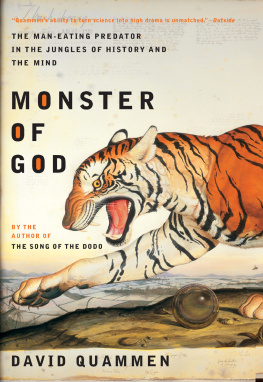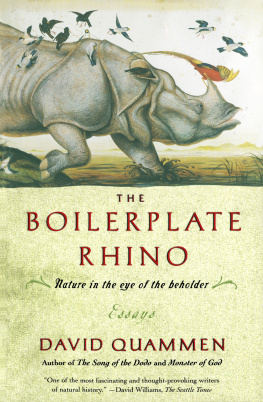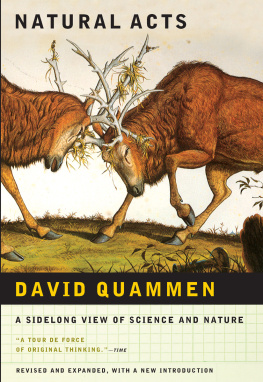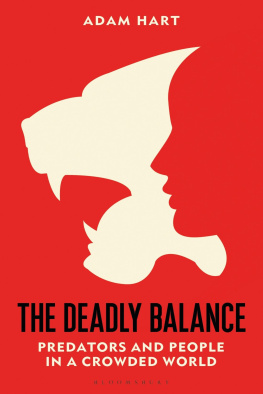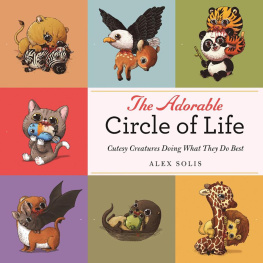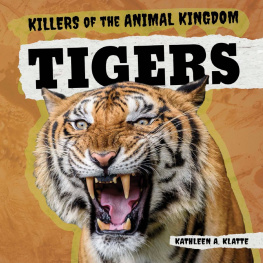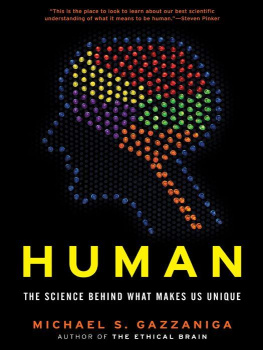Quammen - Monster of God : the man-eating predator in the jungles of history and the mind
Here you can read online Quammen - Monster of God : the man-eating predator in the jungles of history and the mind full text of the book (entire story) in english for free. Download pdf and epub, get meaning, cover and reviews about this ebook. year: 2004, publisher: W. W. Norton & Company, genre: Detective and thriller. Description of the work, (preface) as well as reviews are available. Best literature library LitArk.com created for fans of good reading and offers a wide selection of genres:
Romance novel
Science fiction
Adventure
Detective
Science
History
Home and family
Prose
Art
Politics
Computer
Non-fiction
Religion
Business
Children
Humor
Choose a favorite category and find really read worthwhile books. Enjoy immersion in the world of imagination, feel the emotions of the characters or learn something new for yourself, make an fascinating discovery.
- Book:Monster of God : the man-eating predator in the jungles of history and the mind
- Author:
- Publisher:W. W. Norton & Company
- Genre:
- Year:2004
- Rating:3 / 5
- Favourites:Add to favourites
- Your mark:
- 60
- 1
- 2
- 3
- 4
- 5
Monster of God : the man-eating predator in the jungles of history and the mind: summary, description and annotation
We offer to read an annotation, description, summary or preface (depends on what the author of the book "Monster of God : the man-eating predator in the jungles of history and the mind" wrote himself). If you haven't found the necessary information about the book — write in the comments, we will try to find it.
Abstract: Explores the nature of the worlds largest predators and the variety of human attitudes towards them, discussing how both have changed throughout history
Quammen: author's other books
Who wrote Monster of God : the man-eating predator in the jungles of history and the mind? Find out the surname, the name of the author of the book and a list of all author's works by series.
Monster of God : the man-eating predator in the jungles of history and the mind — read online for free the complete book (whole text) full work
Below is the text of the book, divided by pages. System saving the place of the last page read, allows you to conveniently read the book "Monster of God : the man-eating predator in the jungles of history and the mind" online for free, without having to search again every time where you left off. Put a bookmark, and you can go to the page where you finished reading at any time.
Font size:
Interval:
Bookmark:
Nonfiction
The Song of the Dodo
Essays
The Boilerplate Rhino
Wild Thoughts from Wild Places
The Flight of the Iguana
Natural Acts
Fiction
Blood Line
The Soul of Viktor Tronko
The Zolta Configuration
To Walk the Line
The Man-Eating Predator in the Jungles of History and the Mind

W. W. NORTON & COMPANY
NEW YORK * LONDON
The Publisher and author make grateful acknowledgment for permission to reprint the following:
From The Epic of Gilgamesh , translated by Andrew George (Allen Lane, the Penguin Press, 1999). Copyright in this translation Andrew George 1999. Used by permission of Penguin Press.
From Myths from Mesopotamia: Creation, the Flood, Gilgamesh, and Others by Stephanie Dalley. Oxford Worlds Classics, Oxford University Press, 1998. Copyright Stephanie Dalley 1998. Used by permission of Oxford University Press.
From Beowulf , translated by Seamus Heaney. Copyright 2000 by Seamus Heaney. Used by permission of W. W. Norton & Company.
For U.K. rights please contact Faber and Faber Limited.
From Being Prey, published in Terra Nova , Vol. 1, No. 3. Copyright Val Plumwood. Used by permission of Val Plumwood.
Copyright 2003 by David Quammen
All rights reserved
For information about permission to reproduce selections from this book, write to Permissions, W. W. Norton & Company, Inc., 500 Fifth Avenue, New York, NY 10110
Production manager: Andrew Marasia
LIBRARY OF CONGRESS CATALOGING-IN-PUBLICATION DATA
Quammen, David, 1948
Monster of God: the man-eating predator in the jungles of history and the mind / by David Quammen
p. cm.
Includes bibliographical references.
ISBN: 978-0-393-07630-1
1. Dangerous animals. 2. Dangerous animalsPsychological aspects.
I. Title.
QL100.Q36 2003
591.6'5dc21
2003007812
W. W. Norton & Company, Inc., 500 Fifth Avenue, New York N.Y. 10110
www.wwnorton.com
W. W. Norton & Company Ltd., Castle House, 75/76 Wells Street, London W1T 3QT
To
the good Dr. Byers and Heather
and to
E. Jean
The idea for this book took hold of me during a visit to the Gir forest, in the state of Gujarat, India. The lions of Gir were its starting point. Because my observations of those lions were made over the shoulder of Ravi Chellam, of the Wildlife Institute of India, and were informed by his years of field experience, his published work, and his unpublished data and insights, I owe him a special debt of gratitude, gladly acknowledged here.
The many other scientists and nonscientists to whom Im also indebted are mentioned in my acknowledgments, at the back.
Great and terrible flesh-eating beasts have always shared landscape with humans. They were part of the ecological matrix within which Homo sapiens evolved. They were part of the psychological context in which our sense of identity as a species arose. They were part of the spiritual systems that we invented for coping. The teeth of big predators, their claws, their ferocity and their hunger, were grim realities that could be eluded but not forgotten. Every once in a while, a monstrous carnivore emerged like doom from a forest or a river to kill someone and feed on the body. It was a familiar sort of disasterlike auto fatalities todaythat must have seemed freshly, shockingly gruesome each time, despite the familiarity. And it conveyed a certain message. Among the earliest forms of human self-awareness was the awareness of being meat.
Nowadays the term man-eater may seem retrograde. Some people who care about large carnivorous animals would like to be rid of it altogether. A case can be made that its sexist: man eater. A case can be made that its misleading and sensationalistic, that it tends to reinforce an excessively fearful attitude toward those species of which some individuals occasionally kill and eat a human. The first objectionabout sexism in the use of manis a semantic argument that Ill leave to semanticians. The second objectionabout sensationalism and fearis the one thats relevant here.
Theres some validity to that discomfort with the term. The shock value of the man-eater notion has been more than sufficiently exploited. The bookshelves of my office, crammed with the literature of predation, harbor some unabashedly lurid books with titles such as The Jaws of Death , Crocodile Attack , Man Is the Prey , and simply Attacked! The cover photo on that last one shows the gape of a grizzly bear, lips pulled back in a snarl (or maybe its a yawn, or what biologists call a flehmen grimace, which involves smelling) to display the big canine teeth and the mottled pink-and-gray tongue. This is a closeup so intimate you can almost look down the bears throat and imagine yourself in its stomach, along with the yampah roots and the huckle-berries and the whitebark pine nuts. Three other books in my motley collection carry the titles Maneaters , Man Eaters , and Man-Eater , each with another snarly-faced cover image and one bearing the subtitle True Tales of Animals Stalking, Mauling, Killing, and Eating Human Prey . Also here at hand Ive got The Man-Eaters of Tsavo , a classic of the genre by Lieutenant Colonel J. H. Patterson, who as a construction supervisor on the Uganda Railway in 1898 shot the two marauding lions of his title. Adorning the cover of my Patterson paperback iscan you guess?the face of a snarling lion. The purpose of all these menacing images, in accompanying the word man-eater, is to market zoological melodrama. Less charitably, we might even call it predator pornography. Such melodrama, such toothy porn, gives a skewed impression of the fraught, ancient relationship between large carnivores and the ubiquitous primate that, in moments of reckless desperation, they sometimes turn upon as prey.
Despite those objections, Im unwilling to see man-eater erased from our dictionaries altogether. Inflammatory or not, sexist or not, the word serves a purpose within the English language. Theres just no precise and gender-neutral alternative that says the same thing with the same degree of terse, atavistic punch. It deserves preservation because it labels and commemorates an elemental experiencethe experience in which, on rare occasions, members of our species are relegated to the status of edible meat. Its a reminder of where we have stood, for tens of thousands of years, on the food chain of power and glory. That is, not always and indisputably at the top.
Who are these man-eaters? Defined broadly, the group would include a number of small-bodied, gregarious species of flesh-eating predators as well as some large-bodied, solitary species. It would include hyenas and jackals and wolves and feral dogs and piranhas, and probably some other species of mammals and fish that travel in packs or schools and sometimes gang up on a human. But those arent the man-eaters that concern us here. What Im asking you to contemplate are the psychological, mythic, and spiritual dimensions (as well as the ecological implications) of a particular sort of relationship: the predator-prey showdown between one dangerous, flesh-eating animal and one human victim. That relationship, I believe, has played a crucial role in shaping the way we humans construe our place in the natural world.
Theres no collective scientific name, no formal category, for the animals Im talking about. Lacking a better label, Ill call them alpha predators . They belong to a select but diverse group that transcends zoological boundaries to encompass some mammals, some fish, and some reptiles. In purely scientific terms, the grouping is artificial; it has no taxonomic or ecological basis. Its reality is psychological, as registered in the human mind. It includes the tiger ( Panthera tigris ), the brown bear ( Ursus arctos ), the great white shark ( Carcharodon carcharias ), the Nile crocodile ( Crocodylus niloticus ), the saltwater crocodile ( Crocodylus porosus ), the lion ( Panthera leo ), the leopard ( Panthera pardus ), the Ganges shark ( Glyphis gangericus ), the polar bear ( Ursus maritimus ), and the Komodo dragon ( Varanus komodoensis ), as well as a few other species. The cougar ( Puma concolor ) seems to be reemerging as a candidate. The African python ( Python sebae ), the reticulated python ( Python reticulata ), the anaconda ( Eunectes murinus ), and the jaguar ( Panthera onca ) might also qualify, plus several additional species of crocodilians and sharks. But thats about all. Big cats, some cartilaginous fish, a few reptiles, a couple of bearsits a short, formidable list. What sets them apart from all other creatures, and places them in commonality with one another, is that each of these species has members big enough, fierce enough, voracious and indiscriminate enough tooccasionallykill and eat a human. The danger they present to people is different from all other zoological dangers.
Font size:
Interval:
Bookmark:
Similar books «Monster of God : the man-eating predator in the jungles of history and the mind»
Look at similar books to Monster of God : the man-eating predator in the jungles of history and the mind. We have selected literature similar in name and meaning in the hope of providing readers with more options to find new, interesting, not yet read works.
Discussion, reviews of the book Monster of God : the man-eating predator in the jungles of history and the mind and just readers' own opinions. Leave your comments, write what you think about the work, its meaning or the main characters. Specify what exactly you liked and what you didn't like, and why you think so.

